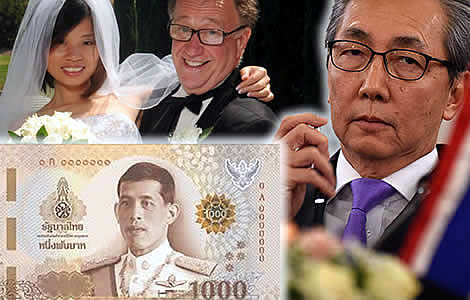The latest growth figures to the end of 2018 are expected to underline the resilience of the Thai economy which is well balanced and has been able to pivot towards world markets whatever the circumstances. Latest figures show exports up with the United States and down with China while there continues to be strong growth. For foreigners in Thailand, the Thai baht’s appreciation spells, in most cases, less spending power as most expats and long term visitors receive income from their western countries of origin. The Thai baht has appreciated 4% against the dollar this year but it is the long term trend that scopes the problem. Thailand also has its own long term issues but for 2019, a year of challenges to the world economy, Thailand is well positioned to perform and deal with any eventualities.
Figures due to be released tomorrow will show the Thai economy coming through a difficult last quarter in 2018 to report a growth rate of 3.6% making it four straight years of growth over the 3% mark. It leaves Thailand in a strong economic position even though there are concerns about the appreciating value of the Thai baht which continues an upward spiral. For foreigners in Thailand, the situation is somewhat different. With some leading western currencies down by as much as 45% over the last 15 years and all well over 20%,the long term trend is only alleviated by a remarkably low increase in Thai consumer prices which have only risen 3% in the last five years. The growing concern about the fate of western economies particularly that of Europe is also of little consolation.

Figures out tomorrow are expected to show Thailand’s economy continued to grow in the last quarter of 2018 despite many adverse factors. A growth rate of 3.6% is expected and when compared to recessionary figures from Germany and a weaker outlook for the Eurozone, the United Kingdom and even China it is easy to see why the Thai baht has been a star currency performer in the last 12 months in Asia and that the prospect is that it may even get stronger. This is beginning to concern many in Thai government circles including Thailand’s Deputy Prime Minister and Economic guru Somkid Jatusripitak.
Thailand’s economic strategist and Deputy Prime Minister is concerned about the rise of the Thai baht
The former Thaksin era minister and now the lead strategist in Thailand remarkable economic achievements in recent years is reported to be worried about the impact of the flying high baht on the prospects of Thai farmers and those in Thailand producing agricultural crops for sale on the international export market. He has been sending signals to the Bank of Thailand which appears to be aware of the problem but is limited in its capacity to respond as the strength of Thailand’s economy requires firm pressure to keep inflationary pressures under control.
Deputy PM respects the Bank of Thailand’s autonomy
The Deputy Prime Minister has already made his views known to the Governor of the Bank of Thailand (BOT), Veerathai Santiprabhob. He has expressed a wish that everything be done to counter the appreciation of the currency. ‘The governor understands the issue but the central bank cannot quickly bring the value of the baht down due to the many influencing factors,’ he said last week. The Deputy Prime Minister stressed however the need to respect the autonomy of the bank in relation to monetary policy.
Thai government plans 2020 impetus for the less well of in Thailand including farmers
The Deputy Prime Minister was speaking as the Thai government put the finishing touches on measures to assist the less well off. This will include a fund of ฿12 billion to be spent in 2020 on initiatives and policies designed to help the poorest in Thailand. Many of these are farmers with monthly incomes of ฿8,000 to ฿10,000 per month. 40% of Thailand’s population still live on farms and the sector is a critically important one to the Thai economy as a key export driver, supply source for food and significantly, an absorber of excess labor if there is ever a down turn. This seems highly unlikely to this time as Thailand imports migrant labor from neighboring countries such as Myanmar, Cambodia and Laos to meet the growing demands of the Thai economy.
Thai baht dollar exchange rate not influenced so much by decisions in Thailand at this time
The Governor of the Bank of Thailand meanwhile has pointed out that the rise in the value of the baht recently against the US dollar has more to do with a perceived weakness in that currency than policy in Thailand. He revealed that a recent rise in Thai interest rates to 1.75% did not make an appreciable difference to that currency exchange rate nor did it spark capital inflows into Thailand. In fact, he highlights a net outflow of $300 million made up of $400 million from the bond market and an inflow of $100 million into the Thai stock market. The Bank of Thailand governor emphasizes the need to be cautious and be prepared at all times for exchange rate volatility which may occur as the result of an unexpected economic downturn or panic in the market to some extraordinary event.
The Bank of Thailand chief highlighted the most benign rate of change for the Thai baht to dollar as somewhere between 31 and 33 cents. However, he said that this value was determined by factors outside Thailand’s control. ‘The most important is how to make sure the economy can absorb the exchange rate volatility,’ he said.
Bank of Thailand governor urges Thai exporters to use financial mechanisms or to price their exports in other currencies beside the US dollar
The governor urged Thailand’s exporters to be more like the country’s importers and use financials mechanisms to hedge against currency volatility. He also suggested that exporters price their products in non dollar currencies such the yuan, yen or ringgit. This may not be so practical however for customers dealing directly or indirectly with American interests. It has been revealed that 70% of Thailand’s exporters are priced in dollars. This is unlikely to change as the US dollar is still seen as the de facto world currency. Recent figures from the Trade Department at the Thai Ministry of Commerce also show a 10% increase in exports to the United States while the country experienced a corresponding decline in exports to China as a result of Donald Trump’s US China trade war.
The Bank of Thailand has revealed that in the last 12 months the Thai baht has appreciated 3.93% against the US dollar. The strength of Thailand’s exports and its booming tourism economy has put the country in a very strong position when it comes to fundamentals. ‘The rise of the baht is in the middle of the group among currencies of emerging economies. For example, the Russian rouble and the Indonesian rupiah have risen much more rapidly, the Governor of the Bank of Thailand said.
The UK pound has lost a staggering 45% of its value against the Thai baht since 2005
For many foreigners living in Thailand or regular visitors, the appreciation in recent years of the Thai baht has been challenging. However, a closer look reveals that for different western expats in Thailand, there have had different outcomes over the last 5 years. For instance the US dollar has lost 4% of its value against the Thai baht in that period while for other western currencies the story is far more dramatic. British expats for instance who make up large number of westerners in Thailand. Much of their spending power, if relying on transfers or payments from the UK, has been deeply curtailed in the last five years. The pound sterling has lost no less than 26% of its value in that period. For Europeans living in Thailand, the euro has lost 21% of its value in the same time frame while the Australian currency has lost a deeply distressing 25% of its value. The signs are that these pressures will continue as Thailand continues to perform well economically. Figures over a fifteen year of even twenty year period going back to the beginning of large numbers of foreigner moving to Thailand to live show an even more dramatic change. The drop against the UK’s pound sterling since 2005 is alarming at nearly 45% of its value while the dollar in the same period, has lost 21%.
In 5 years consumer prices in Thailand for foreigners have only risen 3% but this could change
What allows many foreigners to continue to make ends meet is the relative modest increases in the cost of living which has only increased 3% over that period. This may be likely to change if the robust growth in the Thai economy begins to produce inflationary pressures and there is already some concern about this. In fact, the success of the Thai economy over the the last 30 or 40 years is there to be seen in the figures despite the 1997 crash. Poverty is down dramatically and Thailand is producing a growing middle class of consumers enjoying the dream western lifestyle that may young, university educated Thai workers aspire to.
Thailand has been able to pivot from one market to another and in 2020 joins the World’s biggest free trade area which pushed the EU to No 3
While the world moves into 2019 with some trepidation, there is some confidence within Thailand’s economic leadership that the country’s vibrant export sector, properly managed, and a booming tourism business can help Thailand adjust its position to the worldwide economic winds from wherever they blow. The signs are promising. In 2020 Thailand joins the Regional Comprehensive Economic Partnership (RECP), the biggest free trade area in the world. While it has suffered from the US China trade war, it has been able to pivot to new markets. It is less vulnerable to that threat than other Asian countries like South Korea or Taiwan.
Thailand well positioned to withstand any world economic shock with a balanced and sound economy
The figures expected tomorrow showing fourth quarter growth of 3.6% in 2018 will represent 4 straight years of consistent growth above 3%. The Bank of Thailand is also confident that the Thai economy is strong and has insisted on maintaining the recent interest rate rise despite some voices calling for a reduction. In fact, it is reported that there may be another smaller interest rate rise at some point in 2019. The key issue for the bank, at this point, appears to be external developments on the world stage which may trigger volatility in the markets. If 2019 is going to bring a world economic storm, then Thailand could not be better positioned to withstand it with a balanced and sound economic footing.
Political instability is the key danger that Thailand faces but things are looking positive
Many analysts are looking to the general election on March 24th. Any situation that sees a democratically elected government of any kind take power in June will be viewed as a positive development. So far, it has to be said all political parties have shown remarkable restraint and respect for the process if we interpret the dramatic move by Thai Raksa Chart Party to nominate a Thai Princess as Prime Minster as an exuberant misjudgment. This is now matter for a Thai court to decide. It is significant that on Friday 8th February the Thai baht lost ground. The move and the day’s events certainly stunned the nation. It highlights the key danger Thailand faces and that is political instability. This also explains the decisive and strong response from Thailand’s election commission. However, it does appear that no political party is setting out deliberately to disrupt the process taking into account contrite statements from the Thai Raksa Chart Party in the aftermath of the crisis. This could augur very well for Thailand’s prospects.
Continued decline in the market value of western currencies shows a troubling trend for western expats and foreigners in Thailand which cannot be ignored
For many foreigners living in Thailand, the same cannot be said about their western countries of origin particularly those from European countries. The European Union has developed many internal difficulties and Brexit at the end of March is sure to be a key financial market event even if it is delayed. The political divisions in the United States, while troubling, are still supported by an economy that is growing with strong consumer confidence. The overarching performance of western currencies against the Thai baht in the last fifteen years or so leaves many foreigners living in Thailand and even those who are regular visitors, still deeply troubled.


















